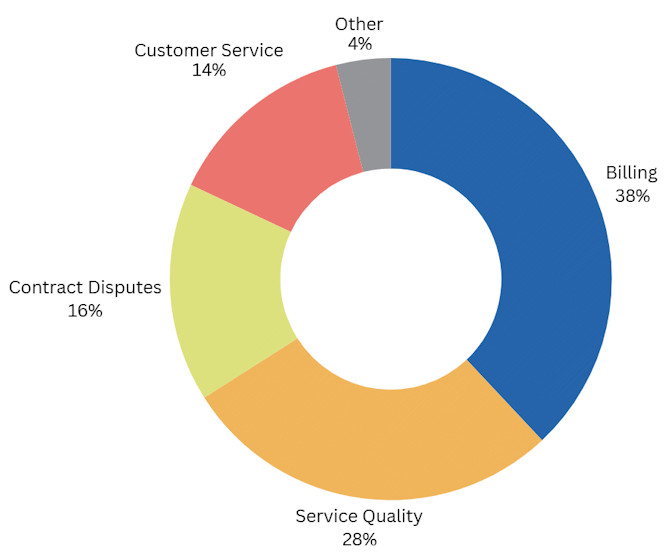If you’ve ever spent an afternoon listening to hold music while waiting for your Internet provider to “transfer you to the right department,” you’re in good company. For many Canadians, that experience sums up telecom support filled with long waits, robotic scripts, and the faint hope that maybe this time the issue will actually get fixed.
The truth is, service quality has quietly become the biggest differentiator in Canadian telecom.
Price wars and speed claims are easy; genuine care for customers isn’t.
The Problem Behind the Polite Hold Music
Canada’s Internet market is dominated by a few large players namely Bell, Rogers, and Telus who control most of the network infrastructure. Smaller competitors often lease access through wholesale agreements, so customers appear to have options… but the same few companies sit behind the curtain.
The result is a market that rewards scale, not service. The bigger these companies grow, the more they rely on centralized call centres, rigid scripts, and outsourced support designed to handle volume, not people. It’s efficient on paper, but it disconnects customers from anyone empowered to help them.
And because these corporations report to shareholders each quarter, their focus naturally drifts toward revenue-generating activities such as marketing, network expansion, and upselling, not customer care. Support is treated as a cost centre, not a loyalty driver.
According to the Commission for Complaints for Telecom-Television Services (CCTS), Internet-related complaints jumped by more than 30% year-over-year in the latest reporting cycle.
The top frustrations? Billing errors, outages, and unhelpful support.

Behind the polite hold music lies a structural problem: big telecoms aren’t built for conversation, they’re built for containment. Every transfer, delay, and escalation is a byproduct of systems optimized to reduce call times, not resolve issues.
Why It Matters More Than Ever
The pandemic made Internet access essential for nearly every aspect of life from work, school, health, connection. Now, every dropped call or slow upload isn’t just an inconvenience; it’s lost income, missed learning, or the inability to stay in touch with loved ones.
Research consistently shows that customer experience drives loyalty more than price or raw speed.
In a market where most networks perform similarly, the difference comes down to how customers are treated when something goes wrong.
Independent ISPs Are Changing the Playbook
That’s where smaller Internet providers are rewriting the rules. Companies like TekSavvy, Oxio, and NetJOI prove Canadians don’t have to choose between affordability and care.
- TekSavvy built its name on transparency and fair dealing even if prices can adjust when wholesale costs rise.
- Oxio earned praise for friendly, digital-first service, though many are watching to see if its 2023 acquisition by Cogeco changes that.
- NetJOI, meanwhile, makes personal care its core advantage combining fast digital support, transparent billing, and locked-in pricing that never climbs after sign-up.
(Image: “Where Your Internet Dollar Goes” — breakdown of wholesale, support, and margin costs)
Smaller ISPs like NetJOI pay wholesale access fees that consume well over half of every customer dollar, yet they’re the ones delivering faster, friendlier, and more transparent service.
Inside NetJOI’s Approach: People Over Promises
At NetJOI, “small team, personal care” isn’t a slogan – it’s the operating model. Customers chat directly with real people who remember their names, not anonymous ticket numbers.
The Service-versary program rewards customers simply for staying, with increasing discounts each year to up to 15% off by year four. That long-term value builds trust in a way no promo ever could.
It’s part of why NetJOI’s customers stick around: the company treats Internet like a relationship, not a contract.
Why Bigger Isn’t Better (Yet)
The big telecoms are trying to fix their service image but often with more automation, not empathy.
AI chatbots, AutoPay-only billing systems, and complex department transfers are designed to cut costs, not improve care.
As explored in Why Canada’s Internet Costs are so high (2025 Report), profit pressure leads to consolidation and efficiency moves that hurt the customer experience. When every decision is made for shareholders, service quality becomes an afterthought.
How to Choose a Provider That Actually Cares
Choosing an Internet provider shouldn’t feel like rolling the dice.
Here’s a quick checklist for spotting companies that truly put customers first:
- Can you reach them easily?
If there’s no visible chat or email, consider that a warning sign. - Are contracts optional?
Month-to-month service shows confidence that you’ll want to stay. - Is pricing locked in?
Hidden rate hikes are one of Canada’s biggest telecom complaints. - Do customers mention service, not just speed?
You can’t measure kindness with Mbps, but you’ll see it in reviews.
For more advice, visit our Internet Guides hub with breakdowns on plan comparisons, speeds, and how to spot hidden fees.
Comparing the Experience
| Feature | Big 3 (Bell / Rogers / Telus) | Other Independents (TekSavvy, Oxio) | NetJOI |
|---|---|---|---|
| Contracts | ✅ Required | 🚫 None | 🚫 None |
| Price Increases | ⚠️ Frequent after 12–24 months | ⚠️ Possible with notice | 🟢 Locked-in pricing – guaranteed |
| Support Wait Times | ⏳ Long | ⚡ Moderate | ⚡ Fast, personal |
| Local Care | ⚪ Generic call centres | 💬 Some regional presence | 💬 Small, Canadian-based team |
| Transparency | ⚪ Fine print applies | 🟢 Clear communication | 🟢 Full transparency, no gimmicks |
Each checkmark (✅) represents a strength; ⚪ means mixed.
NetJOI stands apart by guaranteeing price stability, a promise others only imply.
The Bottom Line
Customer service isn’t a “nice-to-have” anymore, it’s the next frontier in Canadian telecom. When Internet access underpins daily life, good service isn’t about speed; it’s about dignity.
That’s why smaller ISPs like TekSavvy, Oxio, and especially NetJOI are redefining what Canadians expect from their providers: clarity, fairness, and actual care.
Because no one should have to block off an afternoon just to fix their Wi-Fi.
